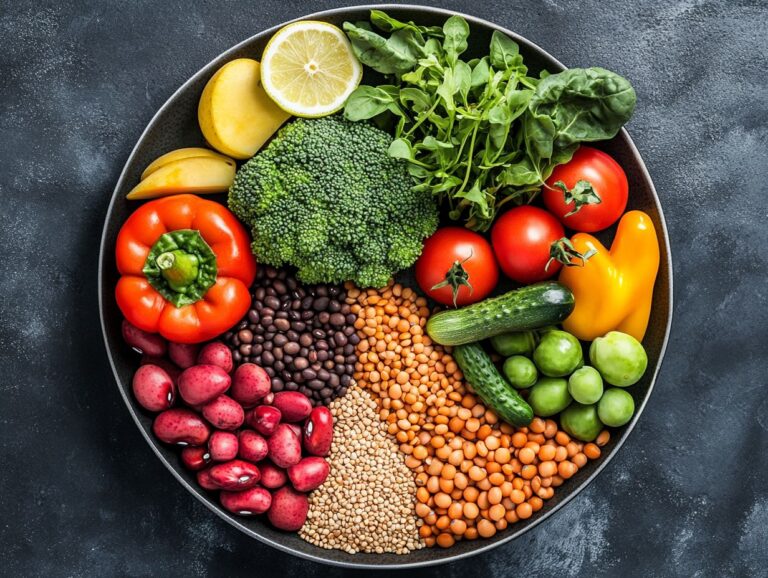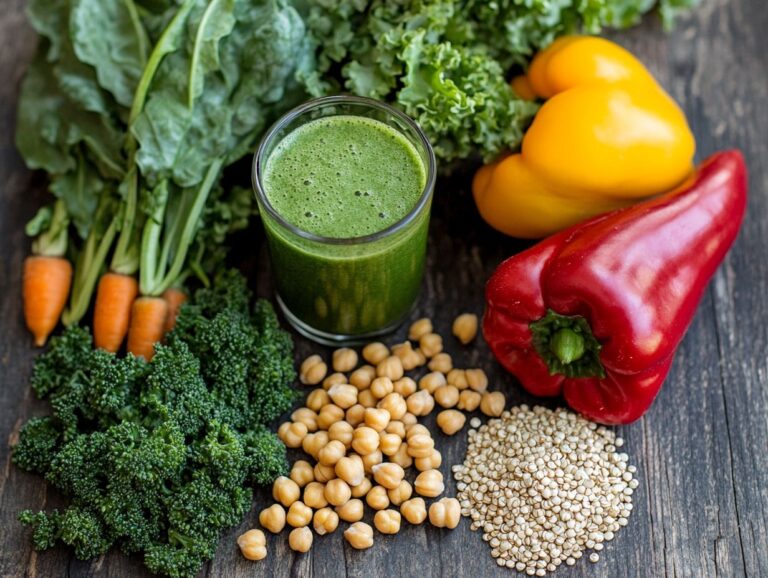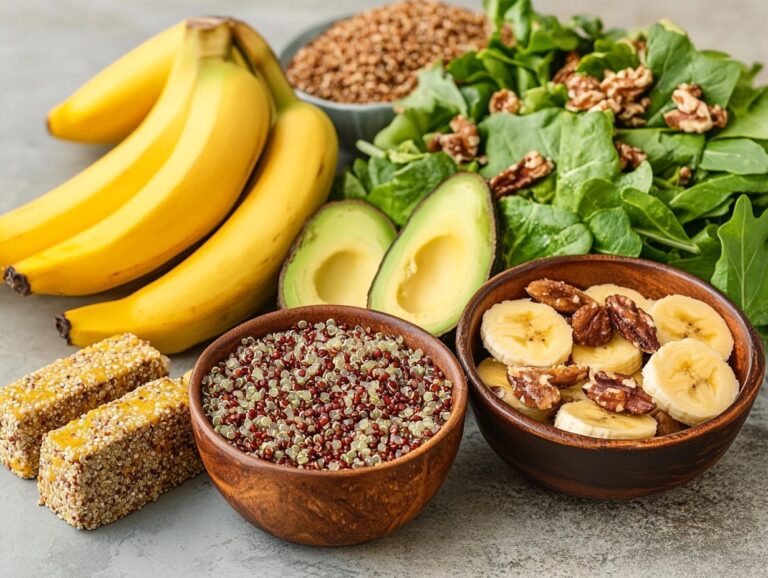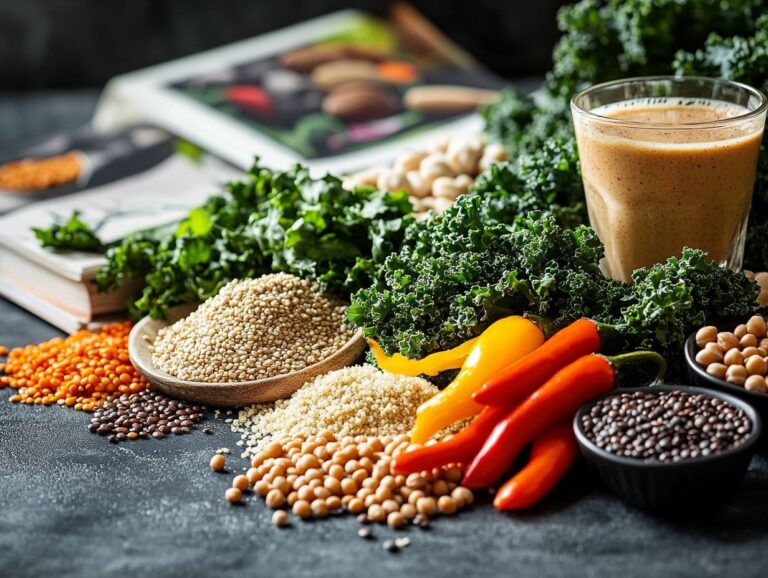What Is a Vegan Diet?
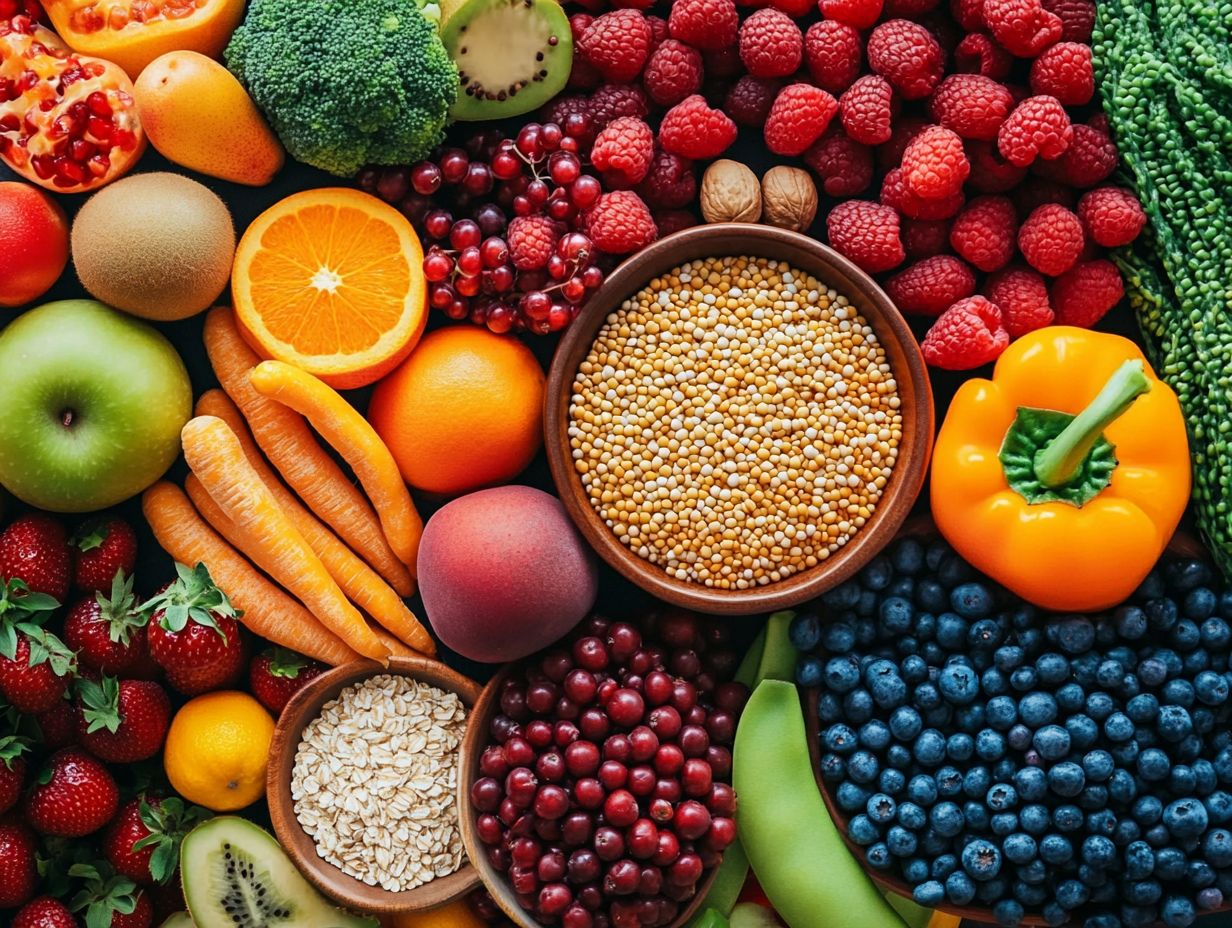
A vegan diet eliminates all animal products, including meat, dairy, and eggs, while consisting of a diverse range of plant-based foods such as whole grains, legumes, fruits, vegetables, nuts, and seeds. This dietary pattern is rich in plant-based nutrition and focuses on whole-foods to meet nutritional needs.
This dietary choice addresses ethical concerns related to animal welfare and offers significant health benefits, including a reduced risk of chronic diseases like type 2 diabetes and cardiovascular diseases, as highlighted by health professionals.
By incorporating nutrient-dense foods, individuals can stabilize blood sugar levels, improve insulin sensitivity, and effectively manage their weight, making a vegan diet an optimal choice for overall health and well-being. Regular exercise and stress management are also important lifestyle factors in maintaining physical and mental health.
What Are the Benefits of a Vegan Diet?
A vegan diet offers several benefits, including overall improvements in health and a reduced risk of chronic diseases such as heart disease and type 2 diabetes. It supports a healthy lifestyle by emphasizing whole-foods and reducing processed foods.
Individuals following a plant-based diet are more likely to consume nutrient-dense foods that are rich in fiber, vitamins, and minerals, while being low in refined carbohydrates and added sugars. This dietary approach can enhance insulin sensitivity, improve blood sugar control, and facilitate weight management, all of which contribute to better physical and mental well-being.
1. Lower Risk of Heart Disease
One of the primary benefits of a vegan diet is the reduced risk of heart disease, achieved by eliminating red meat and processed foods while increasing the intake of whole grains, legumes, and healthy fats. By focusing on nutrient-dense foods that are high in fiber and low in saturated fats, cardiovascular health improves significantly, leading to a substantial decrease in overall cardiovascular risk.
The consumption of plant-based foods is essential for effective cholesterol management; foods rich in soluble fiber, such as oats and beans, help lower LDL cholesterol levels. Additionally, a vegan diet is typically high in antioxidants and phytochemicals, which contribute to reducing inflammation—a key risk factor for heart disease.
Studies have indicated that individuals following a vegan diet often experience lower blood pressure, a benefit attributed to their higher consumption of potassium-rich fruits and vegetables. These whole plant foods not only provide vital nourishment but also offer protective effects against chronic diseases, underscoring the heart health benefits associated with a vegan diet.
2. Improved Digestion
A vegan diet promotes better digestion due to its high fiber content, which is abundant in whole foods such as fruits, vegetables, legumes, and whole grains. Increased fiber intake helps regulate bowel movements, improves gut health, and reduces digestive issues, making it a key component of a healthy lifestyle.
Incorporating a variety of plant foods into a vegan diet not only boosts dietary fiber intake but also adds essential vitamins and minerals that support overall digestive function. Foods like beans and lentils are excellent sources of soluble fiber, while fruits such as apples and pears are rich in pectin, which helps soften stool, add bulk, and promote the growth of beneficial gut bacteria.
A well-functioning digestive system enhances nutrient absorption, strengthens the immune system, and reduces bloating. Therefore, a vegan diet, complemented by regular exercise, is vital for supporting a person’s long-term health and vitality.
3. Reduced Inflammation
One of the most compelling benefits of a vegan diet is its ability to reduce inflammation. Plant-based foods are rich in antioxidants and anti-inflammatory compounds that combat chronic diseases.
Consuming a wide variety of colorful fruits and vegetables not only increases the intake of healthy nutrients but also decreases the consumption of pro-inflammatory foods commonly found in diets high in processed foods or red meat. Incorporating foods such as berries, leafy greens, nuts, and whole grains enhances this anti-inflammatory effect.
For instance, berries are abundant in flavonoids, which have been shown to lower inflammatory markers in the body. Additionally, well-known natural anti-inflammatory foods like turmeric and ginger can easily be added to meals or smoothies, contributing to better blood sugar and overall glucose levels control.
A balanced vegan diet that includes legumes, healthy fats, and spices plays a significant role in reducing inflammation, supporting healthy joints and digestive function, and lowering the risk of chronic diseases such as heart disease and diabetes.
By selecting foods rich in these anti-inflammatory compounds, individuals can significantly improve their health, stabilize blood sugar, and feel more energized.
What Are the Possible Causes of High Blood Sugar on a Vegan Diet?
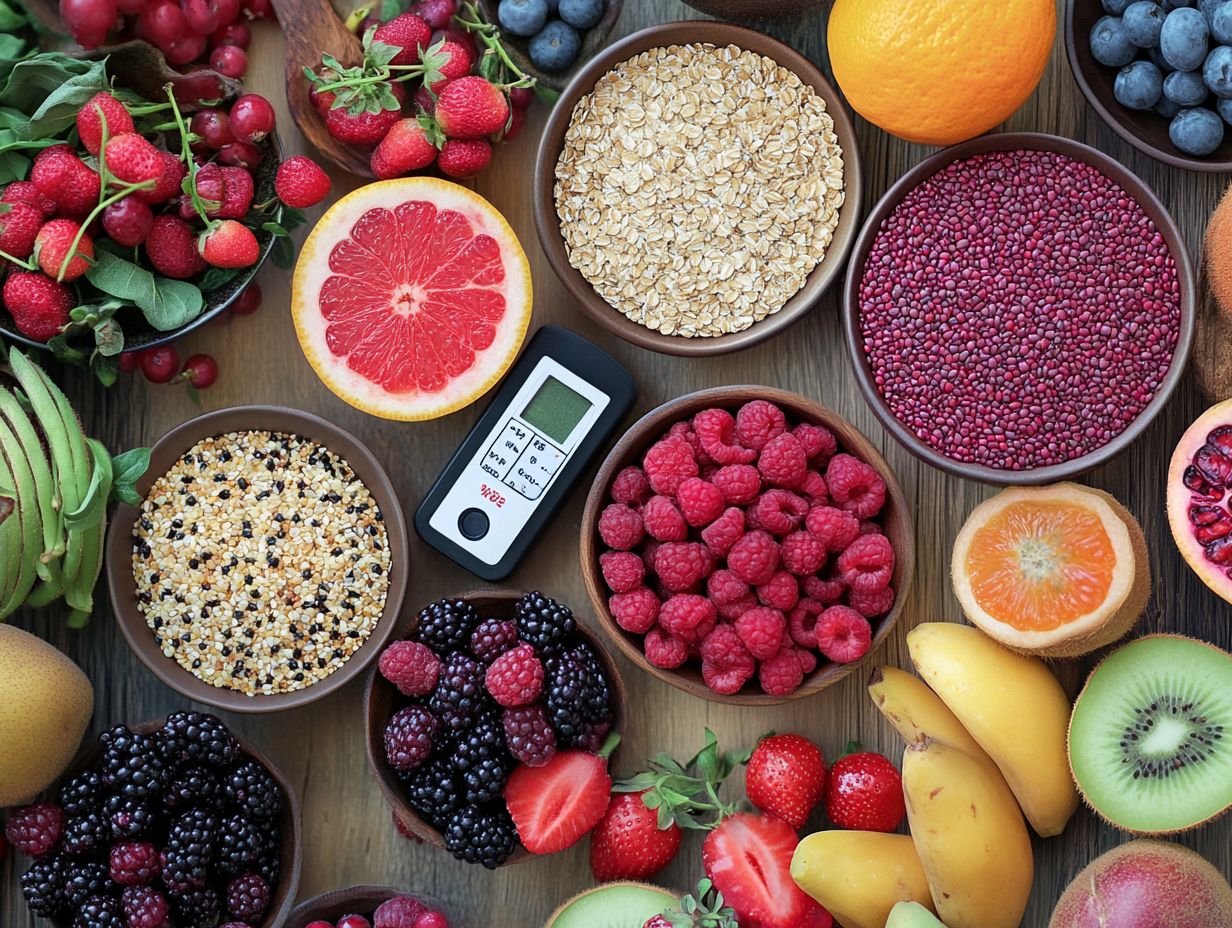
While a vegan diet is generally associated with numerous health benefits, some individuals following this dietary pattern may experience high blood sugar levels due to factors such as a high intake of refined carbohydrates and processed foods, which can contribute to insulin resistance. It’s important to monitor fasting blood sugar and glucose levels regularly.
It is essential for those managing their blood glucose levels to understand these factors, as certain food choices may negate the advantages of a plant-based diet. Working with health care professionals can guide suitable dietary changes.
1. High Intake of Carbohydrates
A high carbohydrate intake, particularly from high glycemic index carbohydrates, can lead to elevated blood sugar levels in individuals following a vegan diet. Foods such as white bread, pasta, and sugary snacks can cause rapid spikes in glucose, making it crucial to opt for lower glycemic index alternatives.
Choosing complex carbohydrates, such as whole grains, legumes, vegetables, and fruits, is essential for maintaining steady blood sugar levels. These foods not only digest more slowly—resulting in gradual increases in glucose—but also provide vital nutrients and fiber that support overall health.
Additionally, pairing complex carbohydrates with healthy fats and proteins can further enhance blood sugar management. Therefore, making informed choices about carbohydrate sources is important for those aiming to lead healthier lives while ensuring proper nutrition on a plant-based diet. Regular exercise may also aid in maintaining energy levels and glycemic index control.
2. Lack of Protein and Healthy Fats
A vegan diet that lacks sufficient protein and healthy fats can lead to poor blood sugar levels. Protein is essential for maintaining muscle mass and enhancing insulin sensitivity.
A deficiency in dietary protein and healthy fats may result in decreased energy levels and increased cravings for carbohydrates, which can negatively affect blood sugar control.
Incorporating foods such as lentils, chickpeas, and quinoa can provide the necessary protein to support muscle repair and growth, helping to sustain energy levels throughout the day. Additionally, healthy fats from sources like avocados, nuts, and seeds are vital for hormone production and play a role in the absorption of fat-soluble vitamins.
These nutrient-dense foods can help stabilize blood sugar levels while also promoting feelings of fullness, which may reduce cravings for sugary foods.
3. Overconsumption of Processed Foods
Processed foods should be avoided in a vegan diet, as their overconsumption is linked to blood sugar dysregulation due to added sugars, unhealthy fats, and low nutritional value. This can diminish the health benefits associated with a well-balanced vegan diet and lead to adverse health outcomes.
For instance, many vegan options such as pastries, snack bars, and microwavable meals can be high in refined sugars and artificial ingredients that elevate blood sugar levels. Additionally, many of these processed foods are low in fiber, which is essential for stabilizing blood sugar spikes.
While these products offer convenience and align with a plant-based philosophy, their potential to negatively impact metabolic health should not be overlooked. Therefore, it is important to consume vegan processed foods judiciously to avoid blood sugar dysregulation.
How Can You Address High Blood Sugar on a Vegan Diet?
To effectively manage high blood sugar on a vegan diet, it is essential to incorporate whole, unprocessed foods that are low in added sugars and rich in nutrients. Utilizing a glucose monitor can help track changes effectively.
By making suitable dietary changes and implementing meal planning, individuals can maintain stable blood sugar levels while following a plant-based diet, addressing lifestyle factors such as stress and exercise necessary for overall well-being.
1. Focus on Whole, Unprocessed Foods
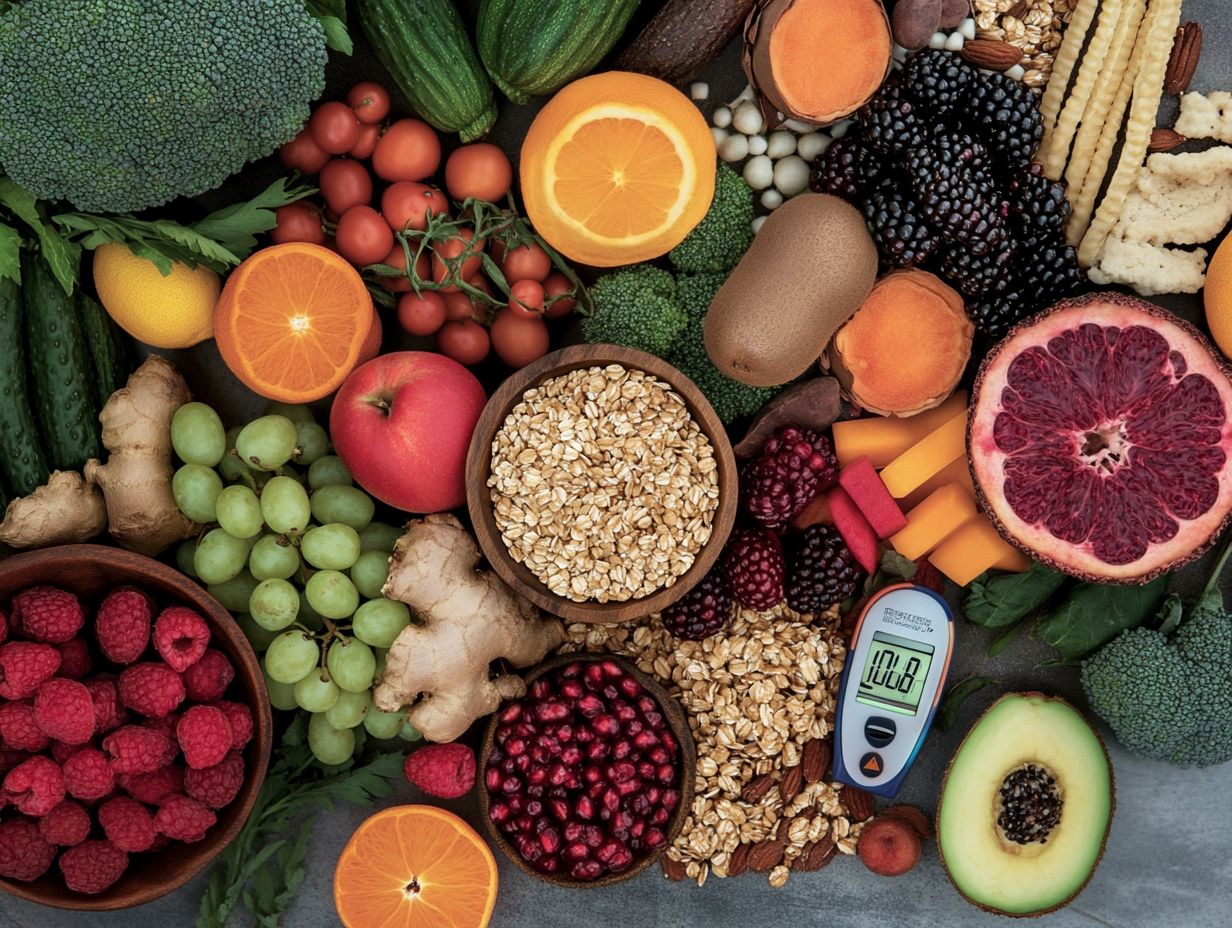
Whole, unprocessed foods are essential for blood sugar control in vegan diets because they are naturally high in fiber, vitamins, and minerals, and contain no added sugars or unhealthy fats. This supports both physical and mental health.
Consuming a wide variety of fruits, vegetables, whole grains, and legumes promotes a nutrient-rich diet that meets all dietary requirements, contributing to improved blood sugar and cardiovascular risk management.
Choosing foods like quinoa, lentils, and leafy greens not only supports good blood sugar control but also adds a variety of flavors and textures.
Berries, which are nutrient-dense and rich in antioxidants and fiber, can help lower glucose spikes. Additionally, sweet potatoes and brown rice provide slow-releasing energy due to their low glycemic index.
2. Incorporate More Plant-based Protein Sources
Incorporating more plant-based protein sources into a vegan diet can enhance insulin sensitivity and help stabilize blood sugar levels. Legumes, tofu, tempeh, nuts, and seeds not only provide protein but also contribute to overall nutrient density.
These protein-rich foods promote a feeling of fullness, which helps prevent spikes in blood sugar levels. Additionally, foods rich in protein and micronutrients supply the body with essential vitamins, minerals, and fiber.
For instance, lentils and chickpeas are excellent sources of protein and dietary fiber, making them beneficial for improved digestion and better blood sugar control. Including diverse plant-based protein sources can fulfill nutritional needs effectively.
Tofu and tempeh are versatile ingredients in a vegan diet that can be included in a variety of meals, offering complete amino acid profiles. Nuts and seeds, such as almonds and chia seeds, provide healthy fats and help maintain stable energy levels throughout the day while supporting overall cardiovascular risk reduction.
3. Monitor Your Carbohydrate Intake
Tracking carbohydrate intake is a crucial aspect of blood sugar control in a vegan diet, as not all carbohydrates have the same impact. Monitoring carbohydrate intake helps manage insulin resistance, a key factor in type 2 diabetes prevention.
By focusing on lower-glycemic foods and engaging in careful meal planning, individuals can maximize nutrient intake while minimizing spikes in blood glucose levels. This approach contributes to effective glycemic control and stabilizes blood sugar levels.
Keeping a food diary, where one records the types and amounts of food consumed at each meal and snack throughout the day, can help identify which meals or snacks may be contributing to unwanted fluctuations in energy levels. This practice can highlight the presence of refined carbohydrates and processed foods that may need to be adjusted.
Incorporating whole grains, legumes, vegetables, and fruits into meal planning can ensure a slow release of energy.
Additionally, understanding the glycemic index of foods, which ranks carbohydrates based on their effect on blood sugar, is essential for making informed dietary choices. Choosing low-sugar fruits and nutrient-dense options can further enhance dietary patterns.
4. Consider Supplementation
Supplementation can be beneficial for individuals following a vegan diet, particularly in meeting dietary needs that impact blood sugar management. Consulting with health professionals can help identify which supplements, such as vitamin B12, omega-3 fatty acids, or vitamin D, may be necessary to support overall health and wellness. These supplements align with dietary guidelines to ensure nutritional needs are met.
Those adhering to a vegan lifestyle should consider supplementing with essential nutrients if they are not obtaining adequate amounts, as these nutrients are crucial for maintaining healthy blood sugar levels.
Omega-3 fatty acids, commonly sourced from fish oil, can also be obtained from algal oil, which offers similar cardiovascular benefits and may assist in controlling blood sugar levels. Additionally, magnesium and chromium supplements play a significant role in improving insulin sensitivity and glucose metabolism.
These supplements not only aid in blood sugar regulation but also contribute to overall vitality, ensuring that a plant-based lifestyle remains nutritionally adequate. They help reduce the risk of chronic diseases such as type 2 diabetes and cardiovascular disease.
What Are Some Tips for Maintaining Stable Blood Sugar Levels on a Vegan Diet?
Several factors contribute to maintaining stable blood sugar levels on a vegan diet, including the following:
- Meal Planning: Effective meal planning is essential for blood sugar control on a vegan diet. This involves timing meals and snacks appropriately, as well as ensuring that portions are properly sized to provide a steady supply of energy and nutrients throughout the day.
- Regular Exercise: Engaging in physical activity offers numerous health benefits, including improved cardiovascular health and increased insulin sensitivity. These factors enable the body to utilize glucose in the blood more effectively.
- Ensuring Adequate Hydration: Drinking sufficient water is crucial, as it helps the kidneys flush out excess sugar through urine. Inadequate water intake can lead to elevated blood sugar levels and contribute to blood sugar dysregulation.
- Choosing Low-Glycemic Index Foods: Opting for low-glycemic index (GI) foods is beneficial, as they are digested and absorbed slowly, resulting in a gradual impact on blood sugar levels. Examples of low-GI foods include nuts, seeds, legumes, whole grains, and non-starchy vegetables.
1. Eat Balanced Meals
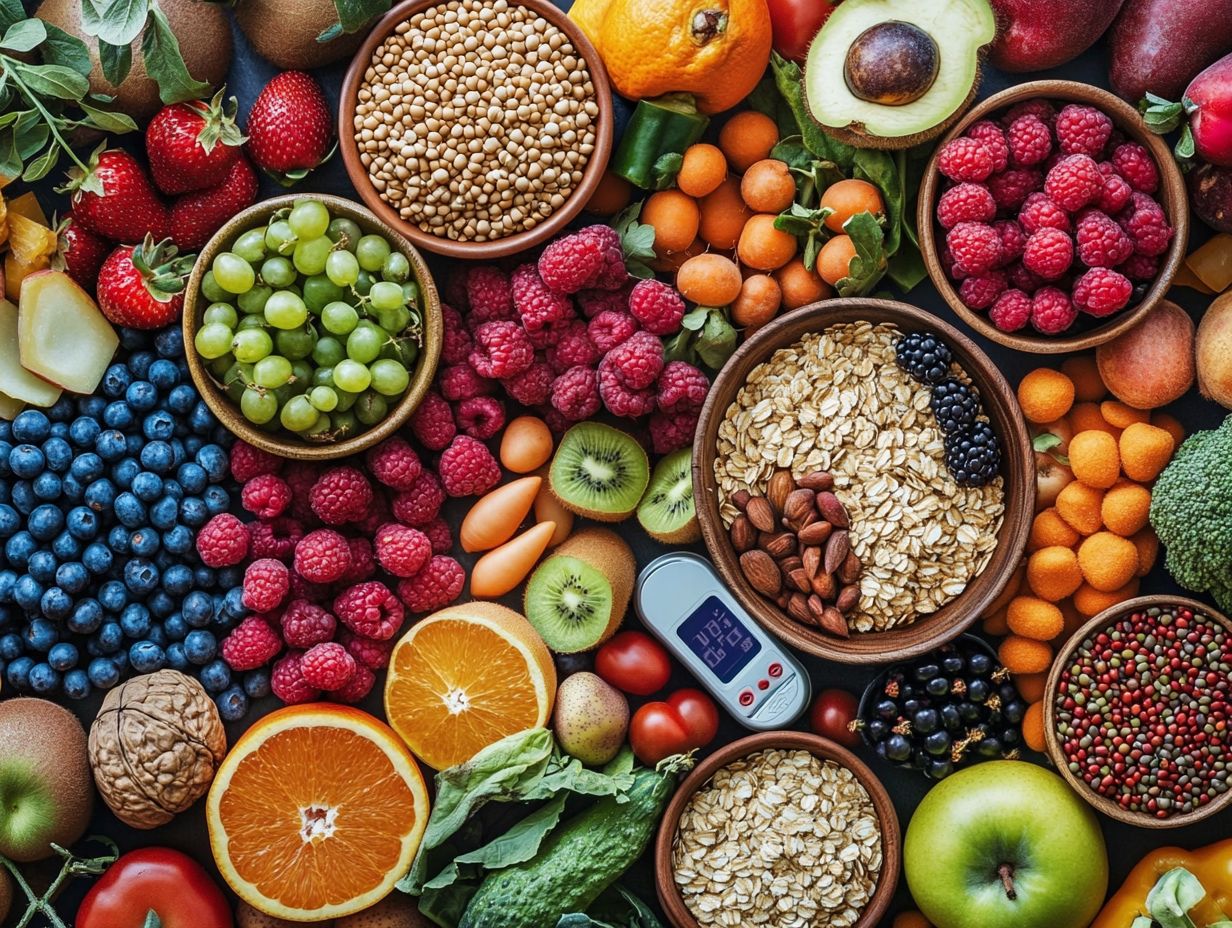
Eating balanced meals that include a variety of nutrient-dense foods is essential for maintaining stable blood sugar levels on a vegan diet.
Incorporating whole grains, legumes, healthy fats, and a diverse range of vegetables can help ensure a well-rounded nutrient intake while also aiding in blood sugar regulation.
For example, quinoa, a whole grain known for its high nutritional quality, can be paired with black beans, which provide protein and fiber to enhance satiety and stabilize blood glucose levels.
A side of sautéed leafy greens, such as spinach or kale, can add extra vitamins and minerals to the meal. Healthy fats, like avocado or nuts, not only enhance the flavor of meals but also contribute to slower digestion and a more consistent release of energy.
Meal combinations such as chickpea salad with brown rice and a drizzle of olive oil effectively support overall health and promote optimal blood sugar control.
2. Stay Hydrated
Proper hydration is essential for maintaining the body’s functions and can help regulate blood glucose levels, preventing them from rising or dropping too quickly.
Staying hydrated is an important factor influencing blood sugar levels, which is why it is included in this guide. Water plays a crucial role in the digestion and absorption of nutrients, making it particularly significant for individuals on plant-based diets that may require more careful planning.
Adequate water intake enhances the kidneys’ ability to filter out excess sugars, helping to prevent potential complications associated with high blood glucose levels.
It is beneficial to consume water at regular intervals throughout the day, along with water-rich foods such as fruits and vegetables, while being attentive to the body’s thirst cues.
Additionally, drinking herbal teas or infusing water with slices of citrus or herbs can enhance the enjoyment of hydration and promote overall health.
3. Exercise Regularly
Regular exercise plays a crucial role in maintaining stable blood sugar levels by improving insulin sensitivity and reducing blood sugar levels. For individuals following a vegan diet, exercise can enhance energy levels and overall well-being.
Engaging in regular physical activity not only benefits metabolic health but also aids in weight maintenance, which is vital for effective diabetes management. Exercise is necessary for improving insulin sensitivity and reducing overall cardiovascular risk.
Activities such as brisk walking, cycling, and yoga can easily complement a plant-based lifestyle while providing significant health advantages.
Local fitness classes or online resources can assist individuals in discovering workouts they enjoy.
Additionally, a vegan athlete may incorporate more legumes and leafy greens into their diet to fuel their exercise, further enhancing the benefits of physical activity for blood sugar control. This dietary pattern supports both physical health and mental health.
4. Monitor Your Blood Sugar Levels
Monitoring your blood sugar levels is essential for anyone following a vegan diet, as it reveals how food and lifestyle factors impact glucose regulation. Utilizing a glucose monitor enables individuals to understand and manage fluctuations in blood sugar, which assists in making healthier dietary choices.
Regular monitoring is crucial not only for preventing spikes or dips but also for identifying long-term trends that may indicate the need for dietary adjustments or medical intervention. By frequently checking glucose levels and maintaining a record, individuals can observe specific patterns that may arise after meals or during exercise.
These patterns allow for adjustments in food intake and modifications to exercise routines for improved outcomes. Understanding these trends provides valuable information to healthcare professionals regarding an individual’s health trajectory, which is critical for effectively managing diabetes while adhering to a vegan diet.
When Should You Consult a Doctor?
You should consult a doctor if you experience symptoms such as excessive thirst, fatigue, or frequent urination, particularly if these symptoms persist despite making dietary changes. These could be signs of blood sugar dysregulation or other health challenges related to type 2 diabetes.
Additionally, individuals with a history of diabetes or other related conditions should see a doctor regularly to monitor their blood sugar levels and overall health.
1. If You Experience Symptoms of High Blood Sugar
If you experience symptoms of high blood sugar, such as increased thirst, blurred vision, or fatigue, it is important to consult a doctor to discuss potential adjustments to your health. These symptoms may be addressed through changes in dietary choices, lifestyle factors, or stress management strategies.
These symptoms may indicate that your dietary regimen, even if plant-based, requires modification. Additionally, frequent urination and dry mouth are common but often overlooked symptoms that can also signify elevated glucose levels in the blood.
Prolonged periods of higher-than-normal blood sugar can increase the risk of severe complications, including nerve damage and cardiovascular issues. Maintaining open communication with your healthcare provider about lifestyle factors such as stress and physical activity is essential, as these can significantly impact blood sugar levels.
Regular health monitoring can help ensure that necessary adjustments are made in a timely manner.
2. If Your Blood Sugar Levels Remain High Despite Dietary Changes
If your blood sugar remains high after making specific dietary changes and adopting a vegan diet, it is important to consult your doctor for a thorough reassessment of your health and to address any underlying issues. This may include evaluating insulin resistance and refining meal planning approaches.
Consistently elevated blood sugar can pose serious health risks, making professional guidance essential for overcoming this challenge. Monitoring your blood sugar levels is crucial, especially when starting a new diet, as it helps you understand how certain foods impact glucose control. Anecdotal evidence from studies like the Tzu Chi Health Study and Seventh-day Adventists can offer insights into successful dietary strategies.
Many individuals may not realize that plant-based meals can still cause blood sugar spikes if they contain high amounts of carbohydrates or sugars. Since what works for one person may not work for another, personalized considerations regarding diet and health are vital.
If your blood sugar levels do not decrease, your doctor may recommend additional tests or changes to your diet, medications, or lifestyle to help you achieve healthier glucose levels. This can include focusing on whole-foods and reducing added sugar intake.
3. If You Have a History of Diabetes or Other Health Conditions
Individuals with a history of diabetes or related health conditions, including type 2 diabetes, should consult a doctor before adopting a vegan diet. This is essential as they require personalized advice and monitoring for their blood sugar levels, which can be impacted by dietary pattern changes, insulin resistance, and glucose levels.
A healthcare provider can offer specific recommendations tailored to an individual’s unique circumstances, which is especially important when making significant dietary changes like transitioning to a vegan lifestyle. This transition can impact insulin sensitivity, blood glucose levels, and other metabolic functions, requiring careful management of lifestyle factors such as exercise and stress management.
An individualized plan from a doctor or registered dietitian can help ensure that essential nutritional needs are met, including adequate protein and vital vitamins such as B12, which may be less abundant in plant-based sources. This is crucial for maintaining energy levels and fiber intake, ensuring a nutrient-dense and balanced diet with whole-foods, legumes, whole grains, healthy fats, and low-sugar fruits.
A well-structured dietary plan can help prevent potential issues like nutritional deficiencies and blood sugar fluctuations, including blood sugar dysregulation and glycemic control challenges. This allows individuals to enjoy the benefits of a vegan diet while maintaining their overall health by managing cardiovascular risk, weight management, and chronic disease prevention.
